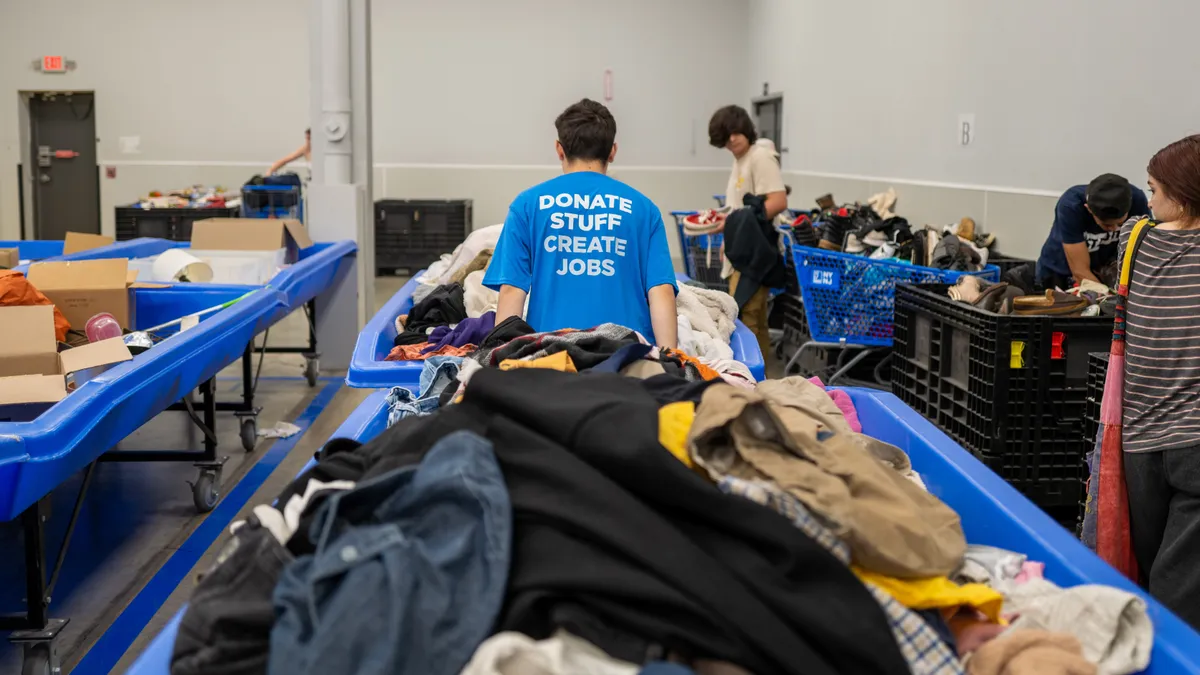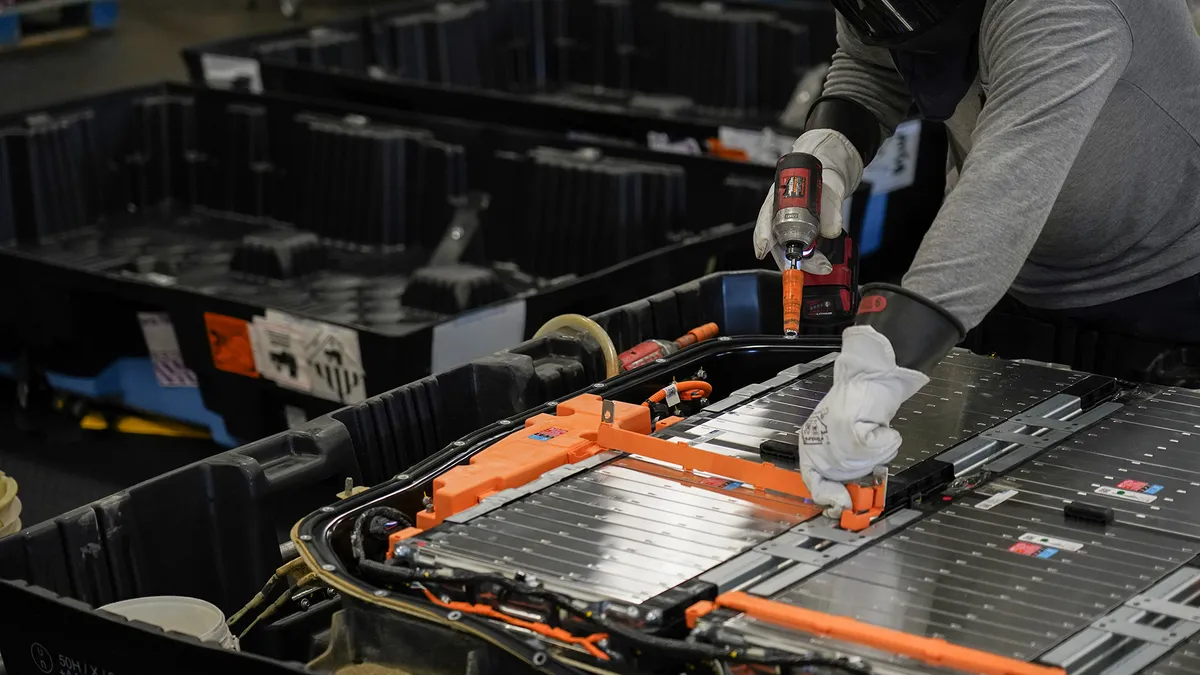Goodwill aims to play a bigger role in North American recycling collection and infrastructure by investing in textile and film plastic recycling “test kitchens” around the country.
Goodwill executives, along with business and nonprofit partners, convened at the organization’s first sustainability summit last week to discuss its role in diverting more materials from disposal. Long known for its thrift resale business, Goodwill in recent years has invested in numerous recycling and reuse projects for materials it can’t sell directly in its stores, including certain textiles, glass and film plastic.
Steve Preston, president and CEO of Goodwill Industries International, said Goodwill sees itself as ideally positioned in the recycling arena because of its ability to operate on both a local and national scale. Goodwill operates as 154 autonomous regional organizations, which Preston says makes it easier to foster local connections with recyclers, remanufacturers and reuse programs and respond to unique local needs.
“Over time, I think many of us would hope that Goodwill would be the destination for more than resale,” he said during a media event at the summit, held Aug. 15 in Washington, D.C.
For example, the general public often donates unwanted items inside plastic trash bags, which many Goodwill stores aren’t able to recycle. Goodwill of Greater Washington, located in the Washington, D.C., area, now sends those plastic bags to Trex, a company that makes plastic decking material. It’s a partnership that makes sense in part because Trex is located “right in our backyard” in Virginia, making logistics easier, said Catherine Meloy, president and CEO of Goodwill of Greater Washington.
The Association of Plastic Recyclers envisions Goodwill becoming a bigger, more intentional aggregator of film plastic for recycling, especially in places like Oregon. That state recently passed an extended producer responsibility program, which will eventually require the producer responsibility organization to provide recycling services for certain items like polyethylene film.
APR CEO Steve Alexander is pitching Goodwill locations to become film plastic dropoff sites with the goal of helping those businesses connect with regional buyers for the material.
“The general public, they're already familiar with you [as a place] to bring material back,” he told Goodwill employees during a presentation at the sustainability event. By adding film plastic to that list of accepted items, Goodwill would elevate itself as a sustainability resource, he suggested. “We have a huge need in the film flexible arena to develop a collection infrastructure that actually works. We have an eminently recyclable material, a tremendous demand market for a valuable material,” he said.
Meanwhile, several Goodwill locations are also investing time and money into textile recycling initiatives.
Goodwill announced on Friday that it is launching a $2 million traceability study, funded by the Walmart Foundation. The study will focus on increasing diversion for secondhand textiles as well as “improving accountability and transparency” in what happens to those materials, Preston said.
That study follows several years of textile recycling and reuse initiatives, including about 25 Goodwill organizations that participated in a two-year pilot program to recycle unwearable donated clothing led by Accelerating Circularity. The $1.28 million study, also funded by the Walmart Foundation, found that about 60% of the textiles from the pilot were “suitable for existing recycling technologies,” including cotton and polyester materials.
“With that other 40%, we are so close with a lot of other emerging technologies on the horizon to be at scale,” said Jennifer Lake, CEO of Goodwill of the Finger Lakes, one of the participating organizations in the pilot.
Other Goodwill locations are also working on textile-related initiatives. Goodwill-Suncoast, based in central Florida, has partnered with sock company Osomtex to create a Goodwill-branded line of socks made from unsold textiles. And Goodwill Ontario Great Lakes is working with university researchers on using end-of-life textiles to produce biochar as a soil amendment.
Local Goodwill organizations are also involved in textile recycling policymaking. In California, lawmakers are mulling an EPR for textiles bill that would require producers of certain apparel and other textile products to establish a producer responsibility organization. The bill, which received support from some haulers and waste groups, could be the first of its kind in the U.S. if it passes.
Laura Walling, Goodwill’s vice president of government affairs, said the California Council of Goodwills was “at the table very early on” and are generally supportive of the bill. “Conceptually, they're excited about an EPR program for textiles there,” Walling said, while adding that “the devil’s in the details” on where Goodwill would be able to play a role in the implementation process along with retailers, collectors and sorters.
On a national level, Goodwill is “working on developing some principles specifically around EPR, and we're doing that in conjunction with groups like National Retail Federation and other coalitions,” she added, noting that Goodwill would be looking for opportunities where EPR programs recognize the role of nonprofits the same way it includes for-profit companies.
As Goodwill continues to build on its recycling initiatives, it is working on scaling another hurdle: building up the infrastructure necessary to support a growing recycling industry for materials like textiles and film plastic, Preston said.
Rather than building that infrastructure itself, Goodwill is in a position to partner with emerging recycling companies and organizations, he said.
“We’re playing our role as an aggregator, sorter and ultimately a really important provider of feedstock to enable that industry,” he said. “Those people can't build those plants without our product. We can't advance these industries without the feedstock that we provide.”
Local leaders from area Goodwill stores are also playing a major role in fostering those recycling infrastructure partnerships. “One of the important aspects of that is to bring that visibility, to bring that collaboration,” said Preston. Local Goodwills are making decisions about how to connect recyclable materials to the demands of their local recyclers and remanufacturers.
“Nobody else has these opportunities,” Preston said. “We've got the scale, we've got the relationships.”



















